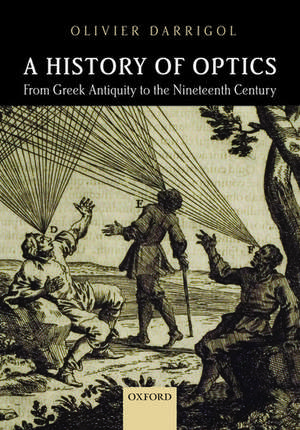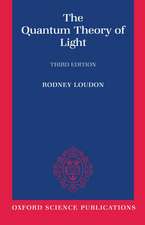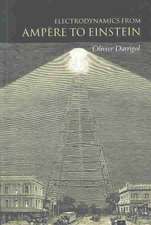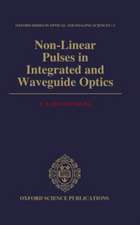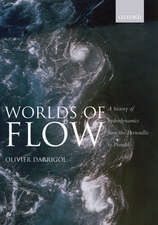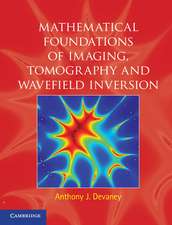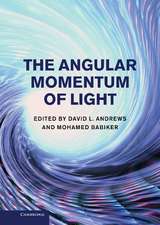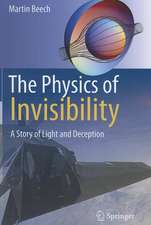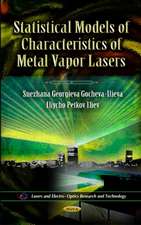A History of Optics from Greek Antiquity to the Nineteenth Century
Autor Olivier Darrigolen Limba Engleză Paperback – 24 mar 2016
| Toate formatele și edițiile | Preț | Express |
|---|---|---|
| Paperback (1) | 302.49 lei 31-37 zile | |
| OUP OXFORD – 24 mar 2016 | 302.49 lei 31-37 zile | |
| Hardback (1) | 467.59 lei 31-37 zile | |
| Oxford University Press – 26 ian 2012 | 467.59 lei 31-37 zile |
Preț: 302.49 lei
Nou
Puncte Express: 454
Preț estimativ în valută:
57.88€ • 60.59$ • 47.89£
57.88€ • 60.59$ • 47.89£
Carte tipărită la comandă
Livrare economică 25-31 martie
Preluare comenzi: 021 569.72.76
Specificații
ISBN-13: 9780198766957
ISBN-10: 0198766955
Pagini: 340
Dimensiuni: 173 x 244 x 18 mm
Greutate: 0.57 kg
Editura: OUP OXFORD
Colecția OUP Oxford
Locul publicării:Oxford, United Kingdom
ISBN-10: 0198766955
Pagini: 340
Dimensiuni: 173 x 244 x 18 mm
Greutate: 0.57 kg
Editura: OUP OXFORD
Colecția OUP Oxford
Locul publicării:Oxford, United Kingdom
Recenzii
In this impressive new book Olivier Darrigol, Director of Research at the eminent Centre National de la Recherche Scientifique, Paris, charts the complex and by no means near development of optical theories from the pre-Socratics to just before the advent of quantum theory. Darrigol is a sure-footed guide as he displays a close acquaintance with the sources and supplies helpful quotations and an abundance of visual illustrations. ... He has written an impressive account of the history of optics and one that deserves to be read both by historians of science and by practicing physicists. s Geoffrey Cantor, American Journal of Physics
Although aimed at historians of science, anyone with an interest in optics will benefit from this book. Like any serious history of science, the author recounts a multifaceted story of inspired reasoning, imperfect empirical support, skill, confusion, rhetoric, failure to cite contemporary work, priority disputes, and the weight of authority .... The author has done a great service in charting a clear narrative through the messy detail.
This highly recommended book is rigorous in its physics and mathematics and totally enjoyable to read.
Olivier Darrigol's A History of Optics: From Greek Antiquity to the Nineteenth Century is a lucid, compact account of the science of light over the past 2,500 years. ... This work is the first to tackle a long-term history of optics of such scale and depth ... Darrigol's concise and elegant work gives an excellent overview of the history of optics. It makes few theoretical claims and steers clear of historiographical debates. But its clear presentation of the important continuities of the debate over optical theory through the centuries shows the benefit of looking beyond a single narrow context.
This book presents a comprehensive survey of optical theories from Descartes to the late 19th century. The clear explanations and orderly presentation certainly make it into a major reference tool for those interested in the history of optics as well as to historians of science and philosophy in general.
Darrigol's judicious and thorough historical analysis of the use of the analogy between light and sound is a particularly nice feature of the book.
A History of Optics is a welcome addition since it is the only concise, intellectual history of optics covering such a long period. Instructors in the history of science will no doubt use it as a textbook in introductory history of physics courses; physicists, and specifically optical physicists, may enjoy witnessing the development of the discipline through the millennia.
As an intellectual history the book is well researched, well written, and does an excellent job in showing the importance of optics (and the lightâsound analogy) throughout the development of classical physics.
Although aimed at historians of science, anyone with an interest in optics will benefit from this book. Like any serious history of science, the author recounts a multifaceted story of inspired reasoning, imperfect empirical support, skill, confusion, rhetoric, failure to cite contemporary work, priority disputes, and the weight of authority .... The author has done a great service in charting a clear narrative through the messy detail.
This highly recommended book is rigorous in its physics and mathematics and totally enjoyable to read.
Olivier Darrigol's A History of Optics: From Greek Antiquity to the Nineteenth Century is a lucid, compact account of the science of light over the past 2,500 years. ... This work is the first to tackle a long-term history of optics of such scale and depth ... Darrigol's concise and elegant work gives an excellent overview of the history of optics. It makes few theoretical claims and steers clear of historiographical debates. But its clear presentation of the important continuities of the debate over optical theory through the centuries shows the benefit of looking beyond a single narrow context.
This book presents a comprehensive survey of optical theories from Descartes to the late 19th century. The clear explanations and orderly presentation certainly make it into a major reference tool for those interested in the history of optics as well as to historians of science and philosophy in general.
Darrigol's judicious and thorough historical analysis of the use of the analogy between light and sound is a particularly nice feature of the book.
A History of Optics is a welcome addition since it is the only concise, intellectual history of optics covering such a long period. Instructors in the history of science will no doubt use it as a textbook in introductory history of physics courses; physicists, and specifically optical physicists, may enjoy witnessing the development of the discipline through the millennia.
As an intellectual history the book is well researched, well written, and does an excellent job in showing the importance of optics (and the lightâsound analogy) throughout the development of classical physics.
Notă biografică
Olivier Darrigol is Research Director at Centre National de la Recherche Scientifique, where he has been a researcher since 1983. He won the Marc-Auguste Pictet prize of the Société de Physique et d'Histoire Naturelle de Genève in 2000 and the Grammaticakis-Neumann prize of the French Academy of Sciences in 2004.
